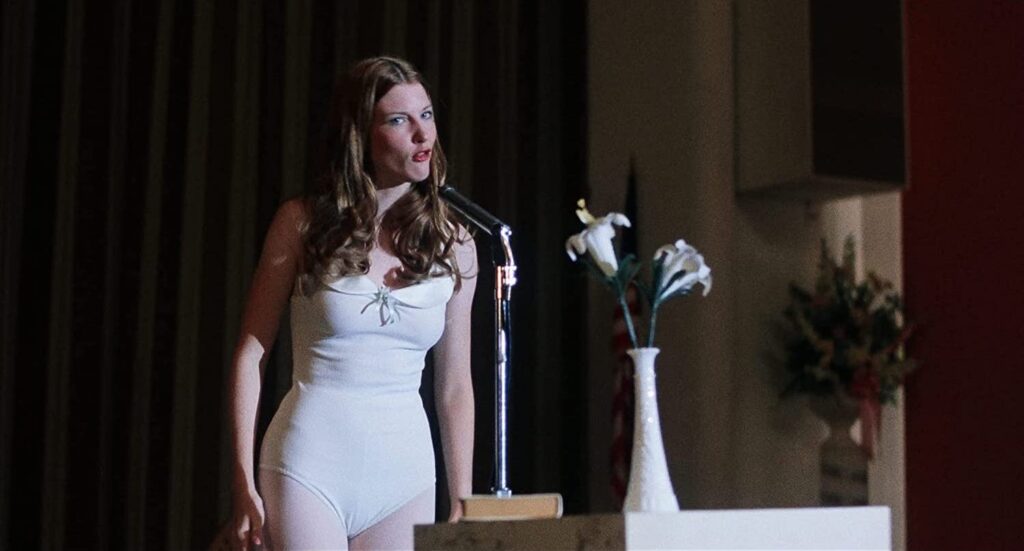
Michael Ritchie’s film Smile (1975) is one of the great American portraits produced by the New Hollywood. 1975 saw the release of two other great national portraits, Altman’s Nashville and Ashby’s Shampoo, that view singular events as a society in microcosm. With Shampoo as the exception, these films approach their respective narratives as a series of interwoven threads, each charting the misadventures of a single character in the ensemble.
Smile is about the Young American Miss contest in Santa Rosa, California. The structure is broken down into the five days that the teenage girl contestants are in town to rehearse and compete with each day being signified by a close-up of “days of the week” panties. During these five fateful days the lives of the contestants (Annette O’Toole, Melanie Griffith, Denise Nickerson, Joan Prather, Colleen Camp), the judges (Bruce Dern, Barbara Feldon), the contest choreographer (Michael Kidd), and the man who makes the statues (Nicholas Pryor) all intersect in explosive and unpredictable ways.
The central or tentpole figure of Smile is Young American Miss judge Big Bob (Bruce Dern). It’s through this character that all of the disparate plot lines come together. Slowly, as these varying interactions and events take their toll on Big Bob, the guise of American middle class prosperity and morality begins to melt away. As Big Bob’s world quietly erodes the viewer sees him as a representative of the very culture to which he belongs that is rendered as an empty, lifeless shell of impossible delusions.
Ritchie’s very matter-of-fact naturalism as a director remains impartial throughout Smile. The film never judges its characters nor does it take a hard stance on their morality. Everyone in Smile is fair game; each is guilty of being complicate to varying degrees of perpetuating the middle class status quo. The sleaziness of Little Bob’s (Eric Shea) scheme to make a few bucks snapping nude photos of the contestants in their dressing room is treated by Ritchie as some variation of Leave It To Beaver hijinks. It’s these kinds of paradoxical juxtapositions in Smile that are sociologically subversive.
One of the great satirical set pieces in Smile occurs at Andy’s (Nicholas Pryor) induction ceremony into the order of “Exhausted Roosters”. Big Bob and other white male pillars of the community hang around drinking beers and cracking jokes while dressed up like Klansmen but wearing a rooster’s comb. The nefarious and frightening visage of an institution of hatred is linked back to the “good ole fun” from which, on some level, it spawned. It’s a loaded connection that lingers beneath the My Three Sons style melodrama of the sequence.
This isn’t to say that Smile is nihilistic in the same way as either Shampoo or Nashville. In fact, when compared to these two better known films, Smile seems almost hopeful. As Smile resolves all of its plot threads in a montage there’s a sense of closure, not finality. Nashville ends with a kind of nationalistic implosion that carries all of the weight of the political assassinations of the late sixties while Shampoo ends with a visual metaphor for the death of love, hope and dreams. Smile isn’t such a grandiose film as to have such lofty designs; it’s content to be a chapter in the lives of its characters and a respite for the lives of those in its audience.
